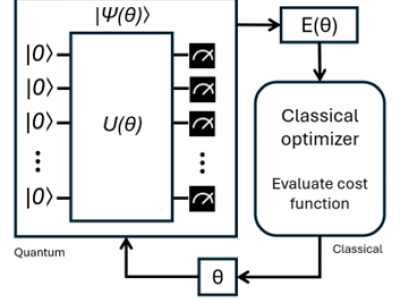Quantum Computing

Cars are one of the biggest polluters of greenhouse gases and to reduce their impact on the environment, there needs to be a nation-wide shift towards the use of public transportation - specifically the use of buses. Designing new bus routes can help buses arrive more frequently on time, especially during rush hour, which is an incentive for people to use buses. The Urban Transit Routing Problem (UTRP) is an NP-hard optimization problem, solved with heuristic algorithms that output approximate solutions, that focuses on constructing bus routes from an existing road network.
- Categories:
 82 Views
82 ViewsAs quantum computing advances, there is a growing need for sophisticated computational methods that efficiently leverage quantum resources. This paper investigates the integration of adaptive quantum circuits with the Variational Quantum Eigensolver (VQE) algorithm, proposing Adaptive VQE as an enhanced approach for dynamically constructing quantum ansätze.
- Categories:
 180 Views
180 ViewsQuantum computing holds the promise of revolutionizing the way we solve complex problems by harnessing the principles of quantum mechanics. However, current noisy intermediate-scale quantum (NISQ) computers face significant limitations due to their small number of qubits and high error rates, making it challenging to execute large quantum circuits that require greater depth, size, or width.
- Categories:
 94 Views
94 Views
Dataset for Analysis of a Programmable Quantum Annealer as a Random Number Generator
Paper: https://arxiv.org/abs/2307.02573
The raw measurements from the D-Wave quantum annealer are -1/+1 spins. They were converted to binary bitstrings by mapping all -1 spins to 0 states.
The datafiles are .bin files where each bit is time ordered (and fixed hardware-indexed ordered). The number of qubits on the device is 2032, so each group of 2032 bits is one anneal-readout cycle.
- Categories:
 114 Views
114 ViewsQuantum computing is one of the most promising technology advances of the latest years. Once only a conceptual idea to solve physics simulations, quantum computation is today a reality, with numerous machines able to execute quantum algorithms. One of the hardest challenges in quantum computing is reliability. Qubits are highly sensitive to noise, which can make the output useless. Moreover, lately it has been shown that superconducting qubits are extremely susceptible to external sources of faults, such as ionizing radiation.
- Categories:
 179 Views
179 Views
Quantum volume (QV) has become the de-facto standard benchmark to quantify the capability of Noisy Intermediate-Scale Quantum (NISQ) devices. While QV values are often reported by NISQ providers for their systems, we perform our own series of QV calculations on 24 NISQ devices currently offered by IBM~Q, IonQ, Rigetti, Oxford Quantum Circuits, and Quantinuum (formerly Honeywell). Our approach characterizes the performances that an advanced user of these NISQ devices can expect to achieve with a reasonable amount of optimization, but without white-box access to the device.
- Categories:
 160 Views
160 Views
The growth of the need for quantum computers in many domains such as machine learning, numerical scientific simulation and finance has necessitated that quantum computers produce stable results. However, mitigating the impact of the noise inside each quantum device presents an immediate challenge. In this paper, we investigate the temporal behavior of noisy intermediate-scale quantum (NISQ) computers based on calibration data and the characteristics of individual devices.
- Categories:
 170 Views
170 Views

